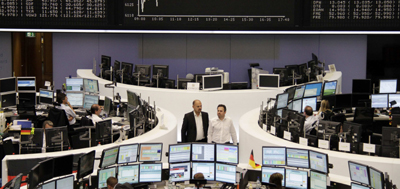Thursday, 26 March 2015 17:41
 LONDON: European shares fell on Thursday, with London Stock Exchange leading the market lower on news Borse Dubai will sell its full stake in the company and ARM Holdings extending the previous session’s steep losses.
LONDON: European shares fell on Thursday, with London Stock Exchange leading the market lower on news Borse Dubai will sell its full stake in the company and ARM Holdings extending the previous session’s steep losses.
London Stock Exchange shares fell 10 percent after a source familiar with the situation told Reuters that Borse Dubai , the LSE’s biggest investor, was selling its stake in the British exchange, which will raise around 1.5 billion pounds ($ 2.23 billion).
“The sale is raising questions as to why it is being made, providing a further drag on the LSE share price. It potentially leaves other investors assessing prospects for the LSE going forward,” Keith Bowman, analyst at Hargreaves Lansdown, said.
Technology stocks fell for a second day, with the STOXX Europe 600 Technology Index down 3.2 percent following weaker U.S. tech stocks.
British chipmaker ARM and Dutch semiconductor equipment maker ASML fell 4.3 percent and 4.2 percent respectively on concerns over weak computer sales.
“It’s difficult to value tech stocks on a fundamental basis,” Clairinvest fund manager Ion-Marc Valahu said, adding he was “underweight” on the European technology sector.
The pan-European FTSEurofirst 300 index was down 1.5 percent at 1,563.49 points by 0916 GMT after dropping over 1 percent in the previous session.
However, energy stocks rose 0.7 percent on a rally in oil following tensions in Yemen. Germany’s DAX, which benefits when the oil price is lower, fell 1.8 percent.
“The threat of a new war in the Middle East has affected sentiment heavily and overrides any economic data that might be supportive for equities. It’s a natural reaction to heightened geopolitical risk directly involving Iran, Saudi Arabia and Yemen,” Lorne Baring, managing director of B Capital, said.
Saudi Arabia and Gulf region allies launched military operations in Yemen on Thursday to counter Iran-allied forces besieging Aden, where the U.S.-backed Yemeni president had taken refuge. The strike stoked concerns for Middle East oil shipments.
Analysts said sentiment also worsened after a report on Wednesday showing U.S. business investment spending plans fell for a sixth straight month in February. Non-defense capital goods orders excluding aircraft, a proxy for business spending plans, fell 1.4 percent last month.
“The disappointment with U.S. durable goods orders, just some days before the first quarter earnings season, raises questions about the sustainability of earnings growth in the U.S. this year. It’s the main risk for markets in the context of current high valuations,” Christian Stocker, equity strategist at UniCredit in Munich, said.
Copyright Reuters, 2015



























